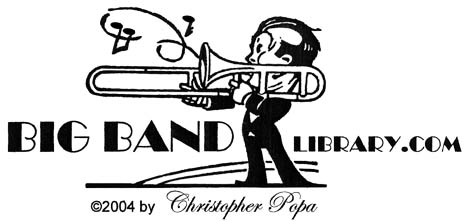
In front of his big band from 1939 to 1952, Chester played tenor saxophone, occasionally sang, composed a few tunes, was a guest on at least 16 "Spotlight Bands" radio broadcasts, appeared a couple times on film, performed from coast-to-coast, and made 129 more sides for Bluebird.
Among his other popular recordings were Practice Makes Perfect, Now I Lay Me Down to Dream, May I Never Love Again, and With the Wind and the Rain in Your Hair.
vital stats:
given name Robert T. Chester
birth Mar. 20, 1904, Detroit, MI
death Nov. 5, 1975, Detroit, MI
education universities in Detroit, MI and Dayton, OH
wife Edna Torrence Chester. div. Dec. 18, 1947?
child b.1943
memberships American Federation of Musicians Local 5 (Detroit, MI) and Local 802
(New York City); ASCAP, 1962- [ sic ]
residence San Fernando Valley, mid-1940s
When Chester first started a band and played the Detroit Athletic Club, he was not successful.
It's been reported by author Peter Levinson that Tommy Dorsey befriended Chester and financed his 1939 attempt, after Dorsey became angry with Glenn Miller, whom he had loaned some money believing Miller's band to be the next big thing and that the loan would entitle him to a piece of the action - but then Miller firmly rejected that demand. Evidently as spite, Dorsey helped Chester's band to be signed to Bluebird, the same label as Miller, and may have been the one to encourage Chester's band to, initially, copy Miller's "reed" style.
When Chester was auditioning vocalists at the Nola Rehearsal Studio in New York City, Frank Sinatra was one of them (and that was where Dorsey first heard Sinatra sing).
After a couple of years, Chester's band found its own sounds, and critical praise was awarded to Alec Fila's lead trumpeting and Dolores ("Dodie") O'Neill's vocals.
Other fine musicians who worked for Chester included, at various times, Conrad Gozzo and Paul Cohen (trumpets), Bill Harris and Frank Rosolino (trombones), Mack Pierce, Peanuts Hucko, Ted Nash, John LaPorta, Herb Steward, and Frank Tiberi (saxophones), Paul Jordan and Teddy Napoleon (piano), Mike Bryan and Steve Jordan (guitar), Hank Wayland (bass), and Sonny Igoe (drums).
However, as with other groups, World War II and the recording ban blunted their momentum.
Chester continued to lead orchestras throughout the '40s and, in 1948-49, took a job as a disc jockey in his hometown.
After he disbanded around 1952, he made a successful career for himself in the automotive business, then centered in Detroit. Interestingly, the second husband of Chester's mother was the head of Fisher Body, a respected automobile coachbuilder located there.
Chester never completely gave up music, for in the early 1970s, one of his fans, Doug Booth, attended a party at the Detroit Athletic Club and saw a poster in the lobby which stated, "Like Old Times, Bob Chester and his Orchestra" and the date of their appearance.
Also around that time, a collector's label, Bandstand Records, released an album of Chester's old Bluebirds with the notation that it contained "16 performances never before on LP" (though Octave Jump, had, in fact, been reissued on the 1966 Reader's Digest set "The Swing Years.")
RCA, the legitimate owner of that material, had virtually ignored Chester's band. But producer Frank Driggs planned to rectify that not long after Chester's death in 1975, with a 2-disc set, "Chester's Choice," on RCA's revived Bluebird LP label.
However, I remember being at the RCA Archives with my brother and we ran across a notation that "Chester's Choice" had been cancelled and could "never" be released. There was no explanation given.
In 2002, Jasmine, located in the United Kingdom, issued a 24-track CD which they titled "Chester's Choice," including Octave Jump and the band's theme, Sunburst - so even if RCA wouldn't or couldn't share some of those performances, I'm glad that Jasmine eventually did.
sources:
"Bob Chester's Wife Blames Liquor, Dancer for New Rift," Los Angeles Times, Apr. 25,
1945, p.9.
Doug Booth, post "Re: Bob Chester in 1949," Big Band Talk forum, bigband-era.com,
Jan. 19, 2005.
"Chester, Robert T," in ASCAP Biographical Dictionary, Fourth Edition (New York City:
Jacques Cattell Press, 1980), p.85.
Charles Garrod, Bob Chester and His Orchestra (Zephyrhills, FL: Joyce Music, 1974).
Roger D. Kinkle, "Chester, Bob," in The Complete Encyclopedia of Popular Music and
Jazz 1900-1950: Volume 2 Biographies A Through K (New Rochelle, NY: Arlington
House Publishers, 1974), p.705.
---, Leading Musical Performers (Popular Music and Jazz) 1900 - 1950: 2150 Biographies
Updated to 1996 With Additions and Corrections Volume III (Mt. Vernon, IN: Windmill
Publications Inc., 1999), pp.56-57.
Peter J. Levinson, Tommy Dorsey: Livin' in a Great Big Way (Cambridge, MA: Da Capo
Press, 2005), pp.95 and 111.
George T. Simon, "Bob Chester" in The Big Bands (New York City: The Macmillan
Company, 1967), pp.124-126.
Joel Whitburn, Pop Memories 1890-1954: The History of American Popular Music
(Menomonee Falls, WI: Record Research Inc., 1986), p.82.
I would like to expand this tribute, if possible, with a new interview of someone who was important to Bob Chester's life and career. Are you an alumnus of his band, a member of his family, or a collector who is knowledgeable about his accomplishments? Please contact me via e-mail
return to "Biographical Sketches" directory
go to Big Band Library homepage
The big bands are back
in a new and exciting way!
BOB CHESTER
"BLUEBIRDS OF HAPPINESS"
by Music Librarian CHRISTOPHER POPA
September 2008
My mother can name his most famous record, Octave
Jump, made for the Bluebird label on March 4th, 1940, after only a few notes. To this day, she's never grown tired of hearing it.
What she wouldn't be able to explain is that its title refers to the interval, or, to be more aurally descriptive in this case, the "jump" between music tones which are eight diatonic degrees apart.
Photo by James Kriegsmann.
